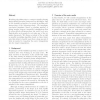Free Online Productivity Tools
i2Speak
i2Symbol
i2OCR
iTex2Img
iWeb2Print
iWeb2Shot
i2Type
iPdf2Split
iPdf2Merge
i2Bopomofo
i2Arabic
i2Style
i2Image
i2PDF
iLatex2Rtf
Sci2ools
123
click to vote
CCCG
2003
2003
On Coherent Rotation Angles for As-Rigid-As-Possible Shape Interpolation
Morphing algorithms aim to construct visually pleasing interpolations (morphs) between 2D or 3D shapes. One of the desirable properties of a morph is avoiding selfintersections of the deforming shape. We investigate topological invariants (based on winding number) of planar morphs between compatible triangulations that do allow global self-intersections but avoid local ones. Equivalently, such morphs do not make any of the triangles degenerate. We discuss a variant of the as rigid as possible morphing algorithm based on these invariants that allows to handle cases when a large amount of twist is required to transform the source triangulation into the target triangulation. 1 Background Morphing is a well-established problem a number of researchers have been working on for many years. We limit ourselves to discussion of the results that apply to the same setting as assumed in this paper, namely morphing between compatible planar triangulations. Different variants of a method of deformi...
| Added | 31 Oct 2010 |
| Updated | 31 Oct 2010 |
| Type | Conference |
| Year | 2003 |
| Where | CCCG |
| Authors | Jaeil Choi, Andrzej Szymczak |
Comments (0)

